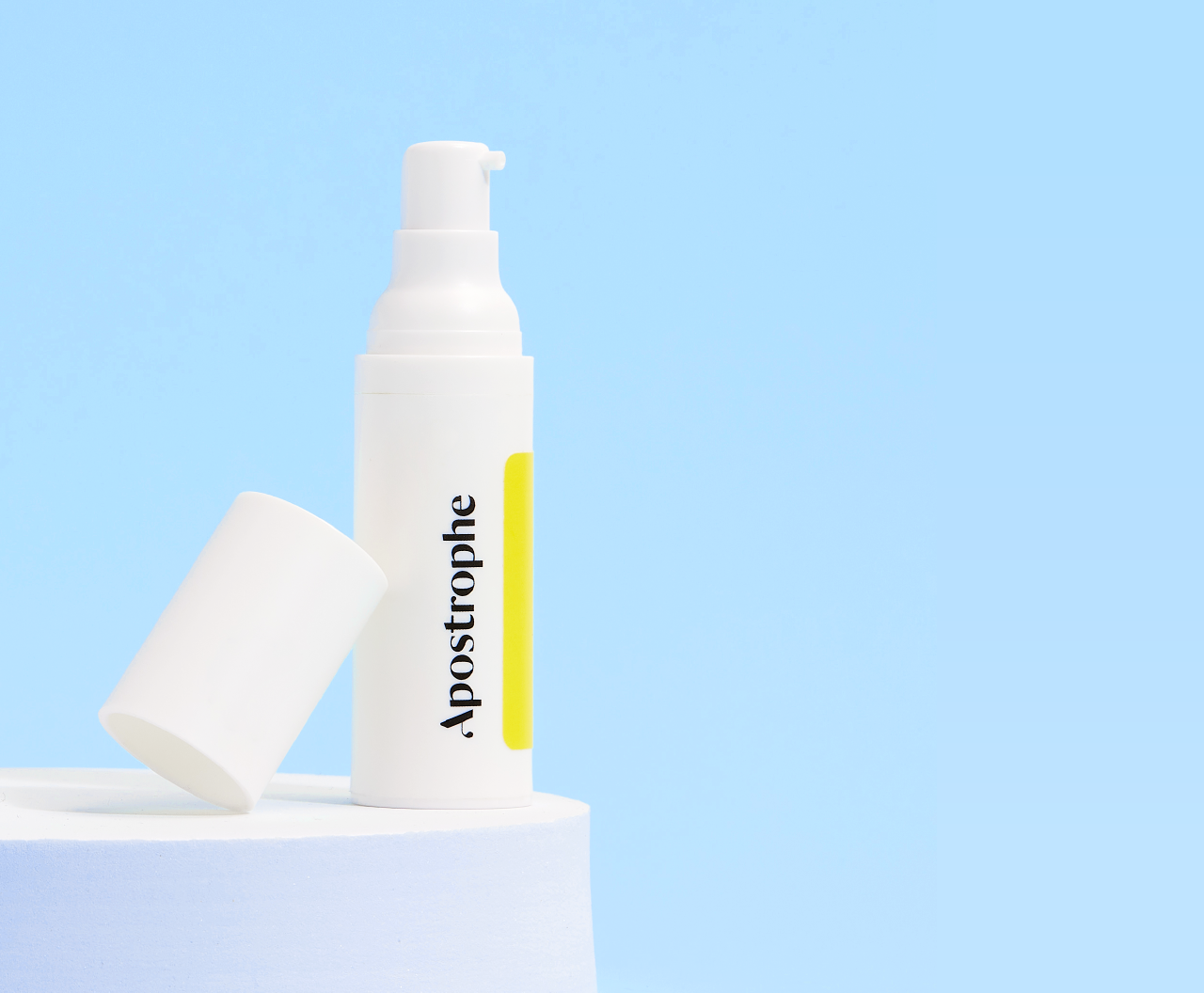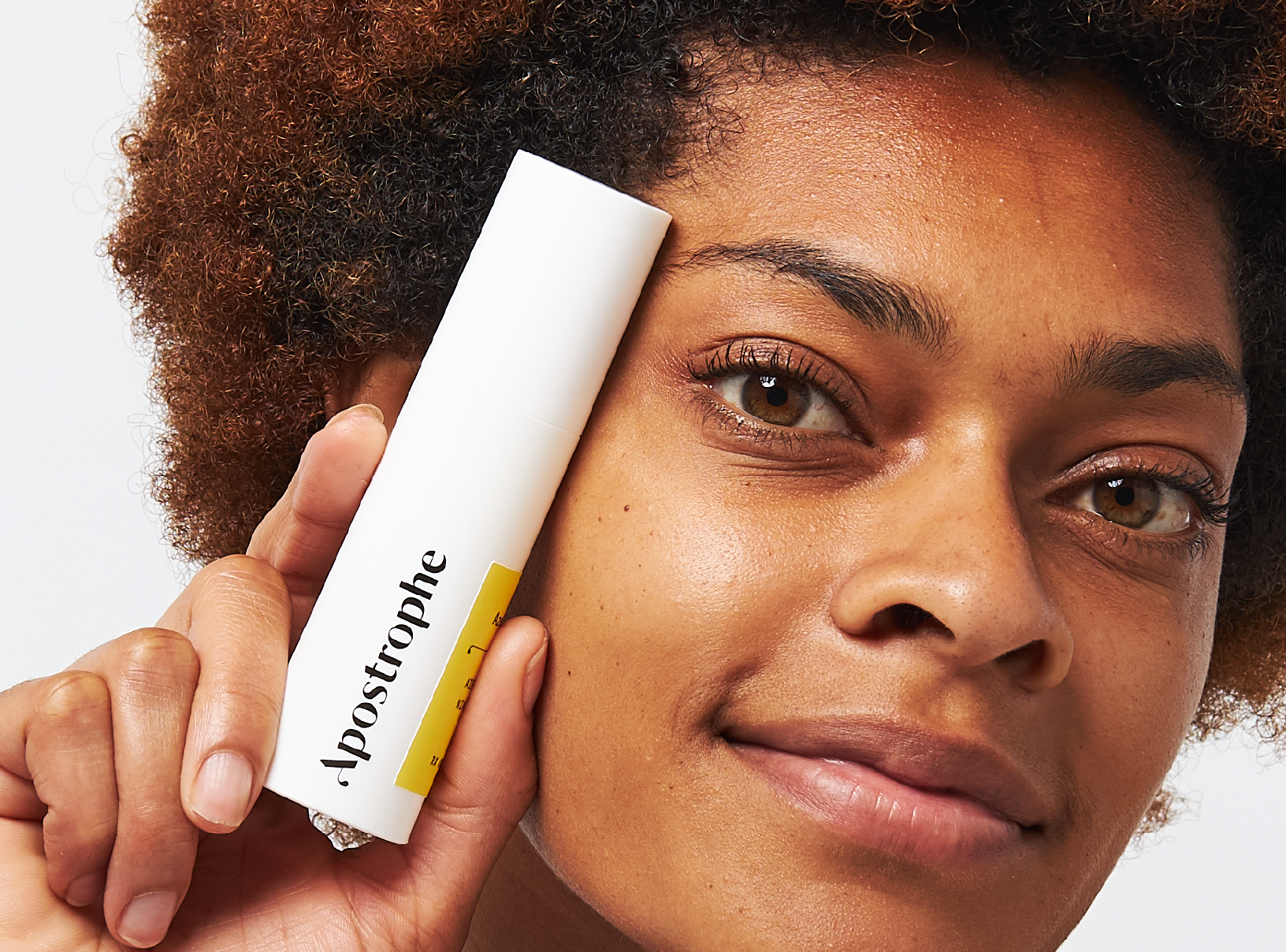Education
A guide to retinol side effects


SHARE
Education
A guide to retinol side effects
Medically reviewed by Vicky Davis, FNP
Written by Apostrophe Team
Last updated 11/1/2024
Retinol is a powerful skincare agent, and its effectiveness for helping women and men reduce the signs of acne, aging, and other skin concerns has been widely discussed for decades.
The only thing about retinol that might be more well known than its benefits is its side effects.
We’ve all heard the horror stories of someone misusing retinol or having sensitive skin and harming themselves. (We’re talking about major skin irritation.)
But what retinol side effects do we really need to worry about, and what factors can make the side effects of retinol more dangerous for you?
These are important questions to answer before you decide whether you want to try retinol for the treatment of skin aging or for the treatment of acne. It's about whether retinol is right for you.
Read on to learn more.
What Is Retinol?
The American Academy of Dermatology Association explains that the active ingredient we know as retinol is a form of vitamin A, which is a compound found in skincare products, as well as prescription and over-the-counter medications.
Retinol improves cosmetic skin problems like uneven skin tone and uneven pigmentation, and it can also reduce dark spots caused by sun damage and other factors. It can even smooth your skin texture in some cases.
Because of these traits, retinol and other forms of vitamin A derivatives can be effective for treating both acne and skin aging (which are two of the most common concerns that people have about their skin).
Retinol is actually part of what we could call the retinoid family. Retinol in fact is the top-line term for every type of retinoid, which includes synthetic retinoids, topical and oral retinoids, over-the-counter retinol products, as well as brand-name prescription versions like Retin-A that a doctor must prescribe.
What Is Retinol Used For?
Retinol is used for a variety of skin-related cosmetic and dermatological issues, including acne.
Acne simply is a bacterial skin infection caused by a build-up of dry skin and dead skin cells, or by sebum (oil) secreted by your body (and a build-up of that), or by the bacteria themselves, which can breed in oil, and use dead skin cells as a food source.
(This guide to the types of acne offers details on how to treat varieties of acne — from pimples and pustules to nodules and inflammatory acne. And retinol is one of those treatment options.)
Retinol works by stripping away the outer layer of dead skin cells that might be clogging up your pores, and it can help reduce the appearance of fine lines this way, too.
The benefit of retinol is twofold, however: When you get rid of older human skin cells, the younger skin cells exposed will look more glowy and healthy.
And when you consider that retinoids have the ability to promote the production of collagen (through the aforementioned exfoliation process), this treatment can have some significant cosmetic benefits for your skin.
Tretinoin, which is a prescription retinoid, has been shown to have collagen-boosting benefits in studies.

PRESCRIPTION TRETINOIN
Target acne, dark spots, and signs of aging with this science-backed ingredient.
And since prescription versions like topical tretinoin have been safely produced, prescribed and used since the 1960s, the treatment we’re talking about is largely considered safe and effective (except during pregnancy).
Retinol Side Effects
It would seem like retinol has a lot to offer, but while those benefits are certainly worth championing, we should also point out that retinol side effects can happen, especially depending on your skin type. Retinol can also worsen an existing skin condition, irritate sensitive skin, and for conditions like inflamed acne, temporarily make the condition more severe.
Frequent complaints about retinol include redness and peeling at the site of application, and this is especially true with stronger retinol prescriptions.
If you tend to have issues due to sensitive skin, or if you’re suffering from an existing skin condition, be sure to let your healthcare provider know before starting a skincare regimen with retinol or retinoids like tretinoin.
Alternative Treatment Options
Retinoids aren’t a perfect treatment. In fact, they’re best used at night, as avoiding sunlight cuts the risk of the sun increasing your irritation.
Retinoids are also fairly volatile when exposed to sunlight, and may break down when exposed to it.
While your retinol option may give you a lot of benefits, you might also consider using it or a form of vitamin A in conjunction with vitamin C for your skincare routine.
Vitamin C functions as an antioxidant for your skin, protecting you from UV rays and other irritants and stressors throughout the day. It is also thought to help provide a ‘glow.’
Prescription antibacterials might also be of benefit if acne is your main skin concern. If you have moderate acne or severe acne, consider asking a healthcare professional about medications like clindamycin, which can be used safely alongside retinol.
Clindamycin has been shown to both inhibit bacteria breeding and reduce inflammation in your skin.
These are just options; a healthcare provider can best help you find your best treatment options for acne or signs of aging.
Retinol Side Effects: Worth It?
Whether you have healthy skin that could use a boost, dry, dull skin that could use a fresh start, or mild to severe acne, retinol is considered a safe and effective tool for helping you get the skin you want.
Retinol does have side effects, though, and while you may want to shelf-swipe all the retinol products you can find, your best first step would be to talk with a healthcare professional about your skin concerns.
Your healthcare provider may help you decide that, depending on your skin type, the retinol side effects might not be worth it, and there might be other exfoliation options for you, instead.
Or your healthcare provider might suggest a topical retinoid like tretinoin, which might be one of the ingredients in your Apostrophe topical treatment, to help reveal glowier skin.

PRESCRIPTION TRETINOIN
Target acne, dark spots, and signs of aging with this science-backed ingredient.
If acne is your concern, something like salicylic acid or benzoyl peroxide could help.
A healthcare professional will be able to help you determine what’s best for your skin. Start the conversation now so that tomorrow you can be on your way toward an ageless, blemish-free glow.
References
Rathi S. K. (2011). Acne vulgaris treatment : the current scenario. Indian journal of dermatology, 56(1), 7–13. https://www.ncbi.nlm.nih.gov/pmc/articles/PMC3088940/.
Clindamycin: Medlineplus drug information. (n.d.). Retrieved May 01, 2021, from https://medlineplus.gov/druginfo/meds/a682399.html.
Telang P. S. (2013). Vitamin C in dermatology. Indian dermatology online journal, 4(2), 143–146. https://www.ncbi.nlm.nih.gov/pmc/articles/PMC3673383/#:~:text=Vitamin%20C%20is%20a%20potent,for%20the%20treatment%20of%20hyperpigmentation.
Rodan, K., Fields, K., Majewski, G., & Falla, T. (2016). Skincare Bootcamp: The Evolving Role of Skincare. Plastic and reconstructive surgery. Global open, 4(12 Suppl Anatomy and Safety in Cosmetic Medicine: Cosmetic Bootcamp), e1152. https://www.ncbi.nlm.nih.gov/pmc/articles/PMC5172479/.
Yoham AL, Casadesus D. Tretinoin. [Updated 2020 Dec 5]. In: StatPearls [Internet]. Treasure Island (FL): StatPearls Publishing; 2021 Jan-. Available from: https://www.ncbi.nlm.nih.gov/books/NBK557478/.
American Academy of Dermatology Association. (n.d.). CAN THE RIGHT DIET GET RID OF ACNE? Retrieved March 5, 2021, from https://www.aad.org/public/diseases/acne/causes/diet.
Acne. (n.d.). Retrieved January 28, 2021, from https://www.hopkinsmedicine.org/health/conditions-and-diseases/acne.
Retinoid or retinol? American Academy of Dermatology. (n.d.). https://www.aad.org/public/everyday-care/skin-care-secrets/anti-aging/retinoid-retinol.
Shop this post

Tretinoin
Like what you just read? Sign up for our email list to get the scoop on skincare science delivered straight to your inbox.

Deep Dives
A dermatologist shares his thoughts on the recent studies about benzoyl peroxide and benzene.
Read More
Education
What is milia?
What is milia? Today, we’re jumping into one type of bump that you may have heard about most commonly in infants — milia.
Read More
Education
Best moisturizer for acne-prone skin
If you have combination acne-prone skin, figuring out which moisturizer is best for your skin might be tough. In this guide, we break down the best moisturizer for combination, acne-prone skin.
Read More